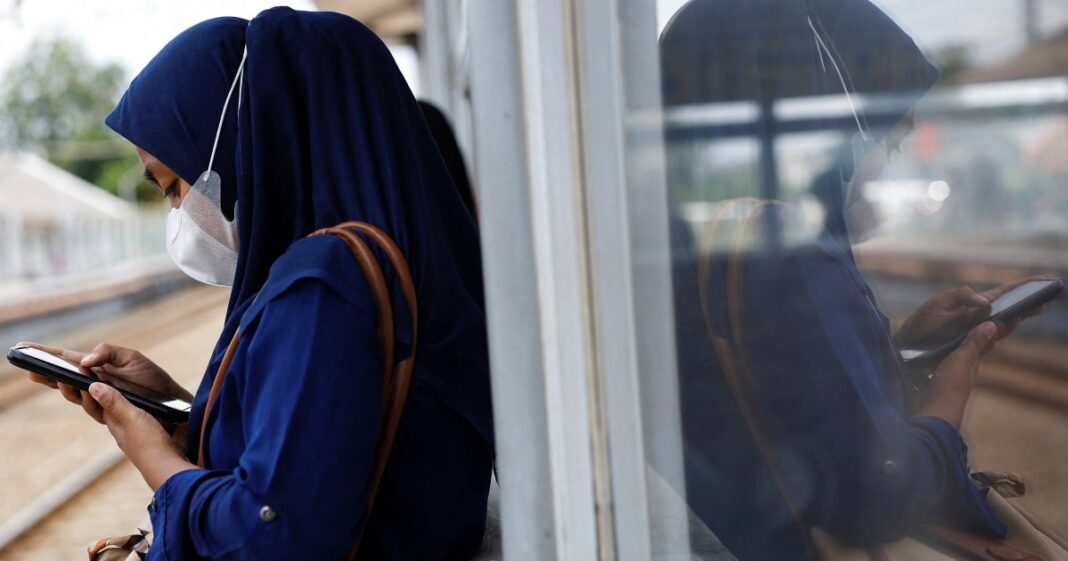Medan, Indonesia – As the mother of an 18-month-old daughter, Laila Lubis is busy experiencing the challenges and joys of new motherhood.
Though her daughter only recently uttered her first words, Lubis is already thinking about how the internet and social media could shape her development long into the future.
“I will never give a mobile phone to my child,” Lubis, who works as a humanitarian worker in Mandailing Natal, North Sumatra, told Al Jazeera.
“I will not allow my daughter to use a mobile phone for as long as I can. Maybe when my child is around six years old, I will think about homeschooling her for kindergarten, so she will have to have access to the internet for that.”
Across Indonesia, countless families are having similar discussions among themselves as the government prepares to introduce a minimum age for using social media.
Minister of Communication and Digital Affairs Meutya Hafid first floated the plans last month, as part of an effort to boost child protection policies in the archipelago of some 280 million people.
Though the government has yet to announce a specific age limit, officials have stressed the need for stronger regulation to protect minors from “physical, mental, or moral perils”.
Indonesia’s bid comes on the heels of a similar effort in neighbouring Australia, which in November became the first country to introduce a ban on under-16s from accessing social media.
Under Australian legislation, social media platforms such as Facebook, TikTok and Instagram face fines of up to $32m if they fail to enforce the age requirements.
In advance of the introduction of its law, Jakarta has announced its intention to impose interim child protection guidelines on social media companies while the government drafts legislation.
Lubis said while the ban has yet to come to fruition, she believes it is positive that the government has kickstarted discussion about keeping children safe online.
“I believe that there are more negatives rather than positives for children using social media and the internet, especially very young children,” she said.
The potential ban is the latest in a series of efforts by the Indonesian government to rein in Big Tech firms.
In October, Indonesian authorities banned sales of Apple’s iPhone 16 and the Google Pixel over the companies’ failure to comply with regulations mandating that smartphones source at least 40 percent of their parts locally.
In 2022, the government threatened to block Google, Facebook, Twitter and Instagram if they did not register with the Ministry of Communication, though the companies were spared from the ban after signing up before the deadline.
Authorities also blocked popular streaming platform Netflix from 2016 to 2020 amid fears that it promoted “inappropriate content”, including pornography, and briefly blocked video-sharing platform TikTok in 2018.
“In a way, the issue does reflect a broader source of tension between Jakarta and Big Tech, and the government’s push for greater corporate accountability in maintaining a secure information space for Indonesians,” Gatra Priyandita, a senior analyst in cyber-technology and security at the Australian Strategic Policy Institute, told Al Jazeera.
“By imposing age limits on social media use, the burden of enforcement shifts to tech companies, making them directly responsible for compliance and potential fallout,” Priyandita said, adding that discussions about restricting social media have swirled in Indonesia for years, although serious efforts have gained traction only recently.
“Authorities have primarily focused on child exploitation, radical narratives, and other harmful content,” he said.
While Australia’s legislation broke new ground, Indonesia’s potential ban would affect far more people.
About 139 million Indonesians use social media and almost half of children below the age of 12 access platforms such as TikTok, Instagram and Facebook, according to the Indonesia Internet Service Provider Association.
Priyandita said Gen Z users aged 12 to 27 have the highest internet usage rate in Indonesia, at 87 percent, with most of them active on TikTok and Instagram – both of which boast more than 110 million users in the country.
“Gen Alpha [people born after 2010] are likely to be highly proactive users of social media as well. Their departure from these platforms will mean that social media may be set to lose huge numbers of followers,” he said.
As in Australia, the plans to enforce a minimum age have also raised concerns about privacy and the potential misuse of user data.
“Enforcing minimum age requirements on social media platforms would necessitate user identification, such as driver’s licences or national IDs. This poses significant privacy risks, particularly for platforms that encourage anonymity, like Reddit, as sensitive data could be breached or sold,” Priyandita said.
“One alternative is for the government to store user data while platforms simply verify IDs without retaining personal information. However, digital ID systems carry their own security vulnerabilities, as they remain susceptible to data breaches and misuse.”
Some Indonesians question the need for government intervention to keep minors away from popular platforms.
Adi Sarwono, a social worker who runs the Busa Pustaka literacy programme for underprivileged children in Lampung, Sumatra, said social media use among young people has both positive and negative aspects.
“The positives include developing children’s creativity and their communication skills. However, there are negative things that social media creates such as affecting concentration, causing excessive anxiety, lack of self-confidence, and even sleep disorders and bullying,” Sarwono told Al Jazeera.
Trying to eradicate or limit social media use among children may be difficult to achieve in an age where most people are online, Sarwono said.
“Technological progress is not something that can be resisted, but it can be used wisely. There is a need to control children’s access to social media and the timing of when they use it,” he said.
“There also needs to be space to ensure children are monitored when using social media.”







